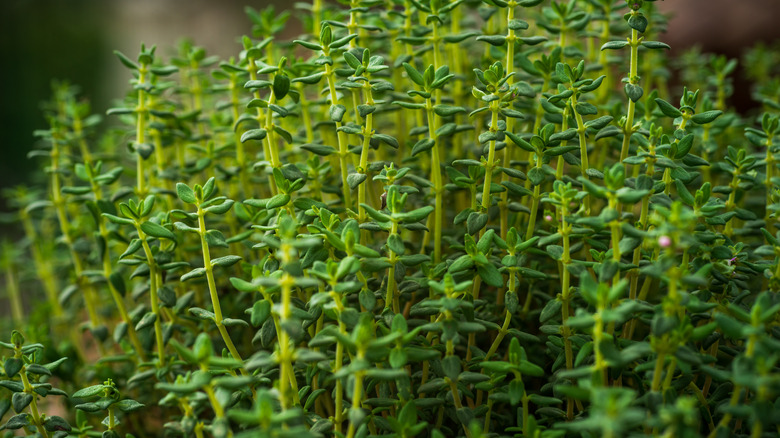If you are a keen vegetable gardener, you have probably come face-to-face with a range of common garden pests that leave all gardeners quaking in their wellies. When you put so much heart and soul into your garden — not to mention blood, sweat, and tears – it can be disheartening to discover that a bunch of hornworms have eaten through most of your tomatoes. Thankfully, you can keep pests out of the garden with this fragrant herb. Hornworms hate thyme, and luckily for you, it’s really easy to grow.
Hornworms look like big green caterpillars, but despite growing up to four inches in length, their green color helps them to blend in with the plant foliage they are feasting on, making them difficult to spot until it is too late. Hornworms get their name from their tail, which looks like a horn. Tomato hornworms are slightly smaller and have a preference for the irresistible tomato plant, but they will also savage your potatoes, eggplant, and pepper plants. They can cause a lot of distress for gardeners as they damage the plants by feeding greedily on leaves, defoliating them until there are no leaves left for photosynthesis, which is essential for the plant to make food and grow. The fruit is also a target, and the hornworms can leave unsightly holes in tomatoes that would certainly put you off your salad!
How to use thyme to get rid of hornworms

Thyme is a powerful pest repellent, and there are a number of other pests that can’t stand its potent aroma — like mosquitos, maggots, and whiteflies. Thyme is very easy to plant in your garden because it is a hardy herb that does well in dry and shallow soil. When deciding where to plant your thyme, you should take into consideration that once established, it will spread easily. This means that you need to allow enough space between your plants for it to grow, without it interfering with the growth of your veggies. Why not try creating a ‘grassy’ thyme border around your vegetable patch?
There is a trick to using thyme in your garden as an effective pest repellent, though — keeping in mind that it is the aroma that deters pests, it’s important to ensure that there are always some bruised leaves on the plant. This allows the chemicals to be released and send those pests on their way. These chemicals, though natural, can cause some irritation, so this is something to be aware of if you are particularly sensitive to allergies. Dill, basil, borage, and calendula are some alternative herbs you can plant to deter hornworms from your garden.
Why you should grow thyme in your garden
There are many benefits to be had from growing a herb garden, and not all of these benefits are culinary. Many herbs can actually be planted as companion plants to other plants and vegetables in order to deter common garden pests. Companion planting is a treasured secret that gardeners have borrowed from farmers, and involves planting mutually beneficial plants side-by-side. This can aid growth by attracting pollinators, provide shelter for more delicate plants from harsh weather elements with protective foliage, and, let’s not forget to mention — keep away unwanted diseases and pests! Thyme is a prime example of a beneficial herb that can be planted alongside other plants to keep certain pests out of your garden, like hornworms, if you’re growing tomatoes.
Thyme can also be a decent substitute for grass as it is tough enough to handle moderate trampling and be used as walkable ground cover. As an added benefit, ground cover plants like creeping thyme assist in suppressing weeds so that you won’t have as much work to do in the garden.